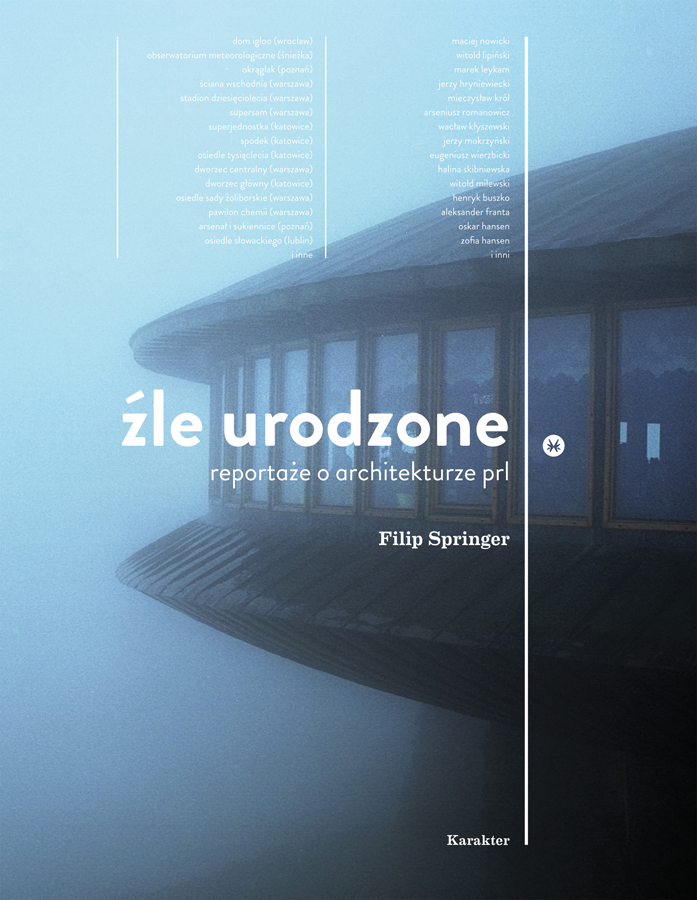 ?Ill-Born. Polish Post-war Modernist Architecture?
?Ill-Born. Polish Post-war Modernist Architecture?
Źle urodzone. Reportaże o architekturze PRL-u, reportage,
Karakter 2012, 272 pages,
ISBN 978-83-62376-12-4
Books and exhibitions like David Crowley?s Cold War Modern have shown that the architectural ideology of late modernism were a key front in the ideological war between the two sides of the iron curtain. In the countries of the former Soviet bloc that architecture has since ended up on the trash heap of history. Subsequent exhibits, books, and other publications defend or simply describe the art created under communism, including socialist modernism, which turned out simply to be ?ill-born,? as Filip Springer?s terrific title suggests. With the innocent eye of someone born just seven years before Poland?s first free elections, this journalist and photographer examines monuments of a prior era and asserts that ?after all, it?s good architecture.?
Ill-Born is also a book of photography ? made up of valuable archival items as well as new photographs by Springer himself ? as well as a collection of reportage on these bastard-buildings. These two halves complement each other wonderfully. Beyond the stigmatized constructions themselves, Springer highlights the fates of the architects, thereby illuminating the reality of the Polish People?s Republic in a rich and nuanced light. Springer investigates what happens to the wartime generation, which sought out some local version of modernity. Particularly fascinating are their games with power.
Filip Springer, then, places his emphasis on people, not on architecture. Nevertheless, the lives of the buildings since 1989 also emerge from among the pages of this book, in the rebuilding and fencing in of socialist spaces, in the ruination of their structures by new investors. The question remains open: are these artistically brilliant, modern symbols of the official style of ?socialism with a human face? actually livable?(Max Cegielski, courtesy of the Book Institute)
Reviews:
?The author doesn?t just describe; he is also a photographer. His photos depict the current fate of buildings which were mainly constructed in the 1960s and 70s.The cool and at first glance trivial scenes with all the staffage spoiling the purity of architectural form ? temporary extensions, signs, tags, and graffiti.This can all be seen on a daily basis by the busy city dweller without any fetishisation or aesthetisation.”
– Klara Czerniewska, Dwutygodnik.com
?Springer doubles and triples himself, changing from documentary writer to investigative journalist to therapist.From behind the buildings he extracts geniuses, plagiarists, friendship, pride, generosity, greed, and weakness.A world, bathed in cigarette smoke, of drawing boards in various urban projects is a brilliant tale about the time when people attempted to grow huge trees in rough communist pots, chasing the world on a Soviet scooter.Before we begin demolishing the history written in urban space in our rush for progress, it?s worth checking whether the dilapidated facade doesn?t hide a slice of life.?
– Szymon Hołownia, Newsweek
“The brilliantly written, and beautifully published and illustrated ?Born Bad. Stories of the Architecture of Communist Poland? by Filip Springer (Karakter) is a story of the great stupidity we allow by not respecting our own heritage of outstanding post-war architecture because it is supposedly ?contaminated? by communist ideology.”- Juliusz Kurkiewicz, Duży Format, Gazeta Wyborcza
??Born Bad? is not simply a collection of historical anecdotes and impressive photos on a trendy topic. This book touches on a re-evaluation, a change in thinking.?
– Marcin Wicha, Tygodnik Powszechny
?Springer?s book opens your eyes. ?Born Bad? contains almost two hundred photos of buildings in a number of Polish cities, complemented by reportage which leads us in to the atmosphere of an epoch when the rush towards modernity had to go hand in hand with absurd political decisions.An important (and beautifully published) book, which teaches us how to look.?
– Dawid Dziwosz, Read_Eat_Slip